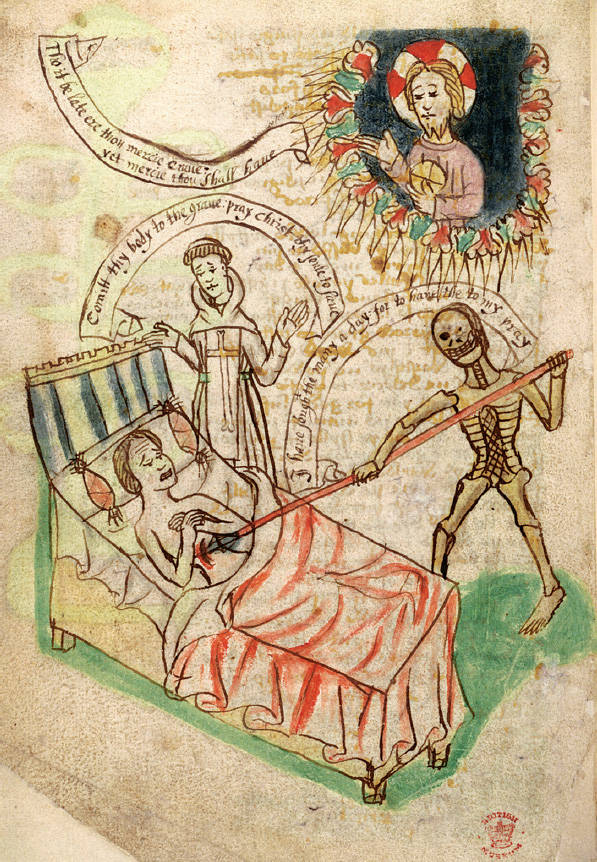Visual Source 11.4: In the Face of Catastrophe—Questioning or Affirming the Faith
The horrific experience of the Black Death also caused some people to question fundamental Christian teachings about the mercy and benevolence of God or even of his power to affect the outcome of the plague. A late-fourteenth-century clergyman in England expressed the dismay that many must have felt:
For God is deaf nowadays and will not hear us
And for our guilt, he grinds good men to dust.47
In a similar vein, the fourteenth-century Italian Renaissance scholar Francesco Petrarch questioned why God’s vengeance had fallen so hard on the people of his own time: “While all have sinned alike, we alone bear the lash.” He asked whether it was possible “that God does not care for mortal men.” In the end, Petrarch dismissed that idea but still found God’s judgments “inscrutable and inaccessible to human senses.”48 Thus the Black Death eroded more optimistic thirteenth-century Christian views, based on the ideas of the ancient Greek philosopher Aristotle, that human rationality could penetrate the mind of God.
Efforts to interpret Visual Source 11.4, a fifteenth-century English painting, raise similar issues to those expressed by Petrarch.

Question
GeUJDss5KQRl7QHVWHj5MsjPjo+e3tVWD7fsRuh5VwjUZhUnm/owYVC/4l1lOfuaQuestion
FW1rcf4cf4gaIZIRN/la/1vlhmlXXmbL4S8yqzLZ06xUUxQel8Rupu4D7h65kjNOFAtfApbhcC+7LL948IQ1m/Zrb3eSEbgJWqSyDUJon4D7kLcO3b0nmAyKWTG/45r5vlpGQ8mRN03PxbdgaqqvcLPcIq+6XEDwG0/dGgOvrC1Px38sQaUMTXqrZp4KTiwP8/B8Y89IFvzMoLFjtrIdqObuCm4=Question
uwmV462kGFZaCQkkhe3Uji4GrzL4a6obNjy5K8N1QRGxu8P/k7vGM3v3UZDwNpuPdj96G9QYzo4ZpBdPRe6+lagY2l/HxdawdVhYuI6p3fgouBA9I5tsC5EgX0eUABMYXEQiszWVAktWSGG8Seb3kDtKmLaoXbWda5aPmlrGu4LpM+KFQuestion
1aVRrapYTpvOll4TGmeIAYOF2Us7cGqIbmEPC/sYY6RzLOtl7NE2lJ44DLX3krCml0nuEp7twd8RfSdCj0GsFVoax1xPY1vwcuWdRYu0FNUHev+wXQaUiScwJfXMUAcydRMp755nVGHeHS93lv2ngn0PpkBker3V60ydrVIlEgqZzi9IlC4Ybkc5s4r3E8h7fEl/kLVgOQ1hLJS9o8+d2TG3mZKa5tEvYmdmUGCYfCzATNyyFd5sX76ELc48oV5gw+knJCYu6fRm/kRLIArdLYmrFEEEIbHt/Zly5uBELiLeABuWwJDhEimnfoaGod6FRDfonSaNzWs=Question
Booi3Mz2mgsGhdfNvXwJnZvVp0+Q+MSvIQy+mP2jQ2HwS9u1Um6iQC/Hj47lbO/xwnEIFforg2TX5TmC+ixlO5D+w1Gf6FULK+m1MQgQzKJNPDVibRkimAt19Ja9NA50B07vSCdX+Q3jOcyasu22ci/EqZkAco/va0j0eG7wyDSPYz+/P1PO6T5HBsx2lG4MXL6xRh37GY1ZrxB1gWImXGRyQxhiiJUW8jQkODEmB2wU0p3yutHt3Bj3QtQD507aqCxEA6WO3J/vkVS7x6HdD/s7VI2n7GLyb3LOsmf+vuA7lgEzcQmDGudalj4LMA0UVQ+AGEmBzbys7V5dvzHKeqYpP4XMx5XMkMza7L9bSDzz97IDIKG+yPilZRqfrl8uJnnG4njX3BTivpwqao6bRaN9oT4UWt9tir4utiYs+doRnDNEEZdtDcAwZktDLSZ0HGL0SrY6lxDaU16P7d6TIjhKpRX7tp0YMH9pdmAUyz9hERGjQuestion
Gfl+nxng2DN7vISLEibnb5PgXtYyTGT+TW2la50OzDxh+UfaOFMiJzz1PT6SCIxsZG+ZPC0k8r4+dcz7819MPMHiFLNwAnjQPwscvGVulgI0d73r2MdEVY5jhKg5gjvLhgbT3ucHrNNoS2OlIdKIAnQ61sXwLmv0gRZ8aFNqhn0fOoDbWlv/ecIRV29PtZzCZxyt26PIemVjx8QMQIxfqabYfiEQTh72m2iQRVNW9F0FtnyDIdWp2iZpuc2dUpZFtBvGKOf/k7g=